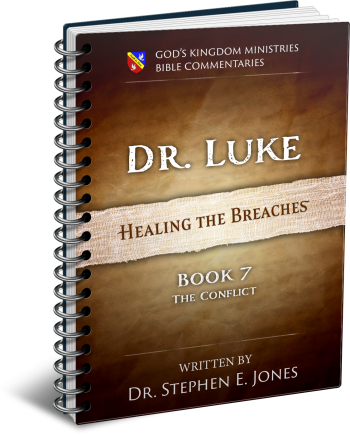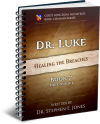Latest Posts
View the latest posts in an easy-to-read list format, with filtering options.

This is a commentary on Luke 18:31 to 21:38 Describing Jesus's trip to Jerusalem and the conflict with the Chief Priest leading to His Crucifixion.
Category - Bible Commentaries

Luke 21:5, 6 says,
5 And while some were talking about the temple, that it was adorned with beautiful stones and votive gifts [anathema], He said, 6 “As for these things which you are looking at [theoreo], the days will come in which there will not be left one stone upon another [lithos epi litho, “stone upon stone”] which will not be torn down.”
In Luke’s narrative juxtaposing the proud, rich scribes with the poor widow, he then gives us Jesus’ prophecy of how this story ends. The scribes, with their fine robes and admiring followers, are now compared to the temple itself with its fine stones (apparel) and rich offerings.
In this, no doubt, Luke intended us to compare the two kinds of temple. Paul says that believers are the true temples of God, collectively being built as a single temple upon the foundation stone of Jesus Christ (Eph. 2:20). Peter says that believers are “living stones” (1 Peter 2:5) unified in this spiritual temple, built upon the foundation of Christ.
By contrast, the scribes were also supposed to be temples of God who were to be built upon the same Messianic foundation. However, not having faith in Jesus as the Messiah, their bodies were only dead stones in a carnal temple, for they had rejected the true foundation stone (Luke 20:17). So their carnal temple, though decorated by long robes that were beautiful in outward appearance, stood on shifting sand and was soon to fall to the ground.
For this reason Luke 21:6 says literally that “there will not be left one stone upon stone.” The first “stone” represents the beautifully-dressed scribes and other religious leaders. The second stone is the foundation stone (Christ). Because there was no cohesion of faith between these stones in the spiritual temple, the temple in Jerusalem was soon to be torn down. The reason was given in Luke 19:46. Their temple had become a den of robbers, due to their violation of the law and rejection of the prophets who had described the manner of Christ’s coming.
In fact, Solomon’s temple itself had been destroyed for the same reason. The prophets speak of the corruption and carnality of the temple and its priesthood, and Jer. 7:11 renders the divine indictment upon them. Jesus repeated this indictment in relation to the temple in His day.
Both Solomon’s temple and Herod’s temple were beautiful to the eyes. But God was not impressed by either, nor was He swayed by their grandeur. He was concerned only with the fact that the temples were supposed to be earthly manifestations of the one heavenly temple made of living stones. The temples were to be the outward manifestations of the spiritual condition of the people, the living stones.
When the earthly temple and the people’s hearts ceased to bear witness of the temple in heaven, God destroyed it and left no stone standing upon another. Away with the lie! Away with the misrepresen-tation, pretense, and hypocrisy!
God is now building a new temple, as Paul says. It is not carnal as the previous temples were. During the construction of the second temple, God told Haggai that this temple would be greater and more glorious than Solomon’s temple (Hag. 2:9). But earlier, in Hag. 2:3 we read,
3 Who is left among you who saw this temple in its former glory? And how do you see it now? Does it not seem to you like nothing in comparison?
The fact is, the second temple was not to be compared with Solomon’s temple. It was only when King Herod rebuilt it, stone upon stone, that it was brought to its place of grandeur that Jesus’ disciples admired. Herod began to renovate the temple in 18 B.C., and it was not completely finished until 65 A.D., just one year before the Jewish Revolt began and just five years before the temple’s destruction.
The fact is that God’s word to Haggai did not apply to the second temple that was completed in his day. It was clear that that temple was not more glorious than Solomon’s temple. One had to see the glory with the eye of faith, which indicates that the true temple was not made with hands but was a spiritual temple, “being built together into a dwelling of God in the Spirit” (Eph. 2:22).
The disciples were impressed, not only with the beautiful stones of the temple, but also with the “votive gifts” that were being offered. Jesus’ prophecy of the destruction of the temple meant that the thirteen “trumpets” and the rich gifts being placed in them would cease as well.
So Luke has an interesting choice of words, which no doubt he understood to be prophetic. The word translated “votive gifts” is the Greek word anathema, a word which is the equivalent to the Hebrew word cherem, “devoted.” It is used in Josh. 6:17, where it speaks of the city of Jericho, “the city shall be under the ban [cherem]” (NASB). The KJV renders it “the city shall be accursed.” It literally reads, “the city shall be devoted,” according to the laws of devotion in Lev. 27:28,
28 Nevertheless, anything which a man sets apart to the Lord out of all that he has, of man or animal or of the fields of his own property, shall not be sold or redeemed. Anything devoted to destruction is most holy to the Lord.
To “devote” something to God is to put it into God’s hands to be used or treated according to the divine will. The root word for cherem means “to seclude.” There were some offerings that were “devoted” to God, and once devoted, they could not be taken back (or redeemed) into the hands of the original owner. These were votive offerings in a positive sense. But some things were devoted to destruction.
The city of Jericho is a negative example of devotion. God required the destruction of Jericho, for it was a prophetic type of Babylon. In this case, it was God’s will that the devoted city would be destroyed. The KJV translation “accursed” is only accurate if God has cursed it. Obviously, in the case of offerings devoted to God, those offerings were only “accursed” if they were unacceptable to God for some reason.
In the case of the “votive offerings” in Luke 21:5, the widow’s tiny offering was accepted by God, while the larger offerings of the rich scribes was accursed. The temple itself, along with its courtyard was also cherem. That means the entire site was devoted to God, giving God the lawful right either to accept it as holy or to curse it and destroy it, along with all of its offerings.
This word cherem really expresses God’s rights as an owner. Hence, when Luke mentions the “votive offerings,” or cherem, he was setting us up for the prophecy of the divine rejection and destruction of the temple, its offerings, and ultimately the entire system of animal sacrifice which characterized that temple under the Old Covenant.
Earlier, in Luke 19:44, Jesus told the disciples that when “your enemies” come to destroy Jerusalem, they will not leave one stone standing upon another. The reason is given when Jesus addressed Jerusalem: “because you did not recognize the time of your visitation.”
From this we see that the divine verdict upon Jerusalem, its temple, and its manner of worship had become unacceptable to God. The divine visitation, or investigation, which began with John, ended with Jesus’ ministry, and just before He was crucified, He issued the divine verdict. Like Jericho, Jerusalem too was “devoted” to God, and both cities found themselves under the divine curse.
So in Luke 21 we are given more details as to the reasons for this verdict. We are shown the type of offering that is acceptable and what is unacceptable. Although the poor widow’s offering was acceptable, she was not in any position of authority in the temple. Those in authority were rich hypocrites who gave large offerings but devoured widow’s houses. Hence, Isaiah 1:10-15 tells us that God considered Jerusalem to be like Sodom and Gomorrah in its corruption. That passage ends with Isaiah 1:14, 15,
14 I hate your new moon festivals and your appointed feasts, they have become a burden to Me. I am weary of bearing them. 15 So when you spread out your hands in prayer, I will hide My eyes from you; yes, even though you multiply prayers, I will not listen. Your hands are covered with blood.
The prophet then tells the religious leaders how to cleanse their hands of this blood:
16 Wash yourselves, make yourselves clean; remove the evil of your deeds from My sight. Cease to do evil. 17 Learn to do good; seek justice, reprove the ruthless; defend the orphan, plead for the widow.
In other words, among other things, the prophet says to plead the cause of the widow when she is oppressed or robbed. We are to be her advocates in a court of law. We are to act as a kinsman redeemer (misunderstood as a “revenger of blood”). The kinsman redeemer in the law was the one responsible to obtain justice (through the courts) for anyone under him that was a victim of injustice.
There is no doubt that Jesus’ comparison between the rich scribes and the poor widow, followed by the divine verdict upon Jerusalem and the temple, was based on the refusal to “plead for the widow.” Instead, they devoured her house. Hence, as the prophet says, Jerusalem became like Sodom and Gomorrah and was to be judged as Jericho (a type of Babylon). Recall also Rev. 11:8, connecting Babylon and Sodom to Jerusalem:
8 And their dead bodies will lie in the street of the great city which mystically [spiritually] is called Sodom and Egypt, where also their Lord was crucified.
What follows in Luke’s account is a lengthy prophecy about the destruction of Jerusalem and the land of Judea which was to come forty years later and again in our own time.